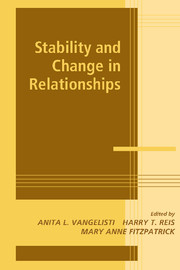Book contents
- Frontmatter
- Contents
- Contributors
- Preface
- PART ONE ACTORS: THE SCAFFOLDING OF STABILITY AND CHANGE
- PART TWO BEHAVIORS: THE PROCESSES OF STABILITY AND CHANGE
- PART THREE CONTEXTS: SOCIAL ENVIRONMENTS FOR STABILITY AND CHANGE
- 11 Social Networks and Change in Personal Relationships
- 12 Creating a Context for Change: Integrative Couple Therapy
- 13 Passionate Love and Sexual Desire: Cultural and Historical Perspectives
- 14 Rules for Responsive Robots: Using Human Interactions to Build Virtual Interactions
- Author Index
- Subject Index
13 - Passionate Love and Sexual Desire: Cultural and Historical Perspectives
Published online by Cambridge University Press: 21 October 2009
- Frontmatter
- Contents
- Contributors
- Preface
- PART ONE ACTORS: THE SCAFFOLDING OF STABILITY AND CHANGE
- PART TWO BEHAVIORS: THE PROCESSES OF STABILITY AND CHANGE
- PART THREE CONTEXTS: SOCIAL ENVIRONMENTS FOR STABILITY AND CHANGE
- 11 Social Networks and Change in Personal Relationships
- 12 Creating a Context for Change: Integrative Couple Therapy
- 13 Passionate Love and Sexual Desire: Cultural and Historical Perspectives
- 14 Rules for Responsive Robots: Using Human Interactions to Build Virtual Interactions
- Author Index
- Subject Index
Summary
Today, the scholarly world is in a state of creative ferment. Western views are yielding to more global perspectives, academic isolation to multidisciplinary cooperation; important intellectual territories are being staked out, new questions posed, and new methodologies utilized in the quest for new kinds of answers.
Few multidisciplinary marriages offer more promise than that between history and psychology. Until recently, history was, in the main, the study of the public arena and of power – of kings, presidents, generals, and war; now it has become the study of Everyone. Once historians were interested in history from the “top down.” Today, a generation of psychological historians is committed to exploring the activities of humankind from the “bottom up.” Their pioneering research has cast a dazzling light into the dark corners of history. These scholars have much to say about such “private” and “psychological” concerns as marriage, love, sexuality, and intimacy; family life, women's issues, child rearing, and emotions.
Their observations and conclusions are fascinating in and of themselves; in addition, by opening up windows to the past, they also furnish social scientists with a wider perspective on the past, present, and future. Psychology, like the other social sciences, once focused almost exclusively on one area, the West, and on one dimension of time, the present. But now new and exciting possibilities present themselves. Historians help us gain an understanding of culture's impact on people's attitudes, emotions, and behavior.
- Type
- Chapter
- Information
- Stability and Change in Relationships , pp. 306 - 324Publisher: Cambridge University PressPrint publication year: 2002
- 17
- Cited by



